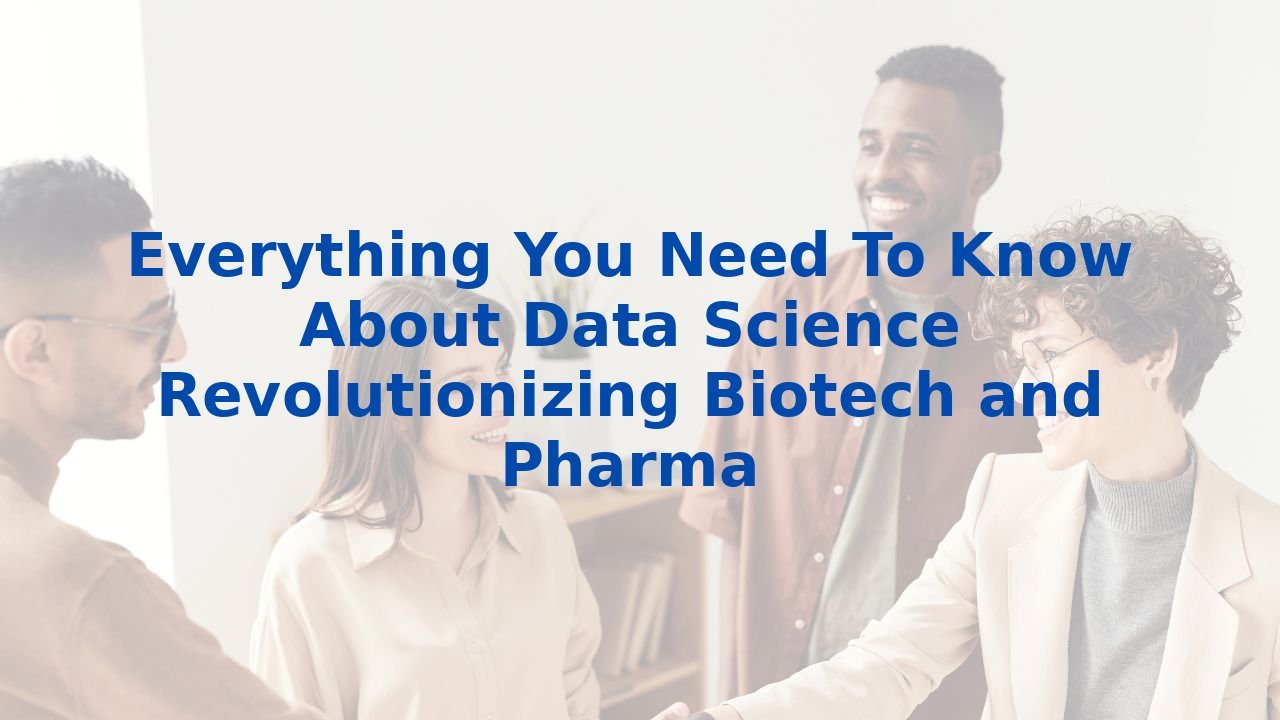Everything You Need To Know About Data Science Revolutionizing Biotech and Pharma
Data Science: Transforming Biotech and Pharma
In the fast-evolving sectors of biotechnology and pharmaceuticals, data science emerges as a catalyst for innovation and efficiency. As the world grapples with complex health challenges, harnessing the potential of data science can pave the way for groundbreaking discoveries and improved patient outcomes.
The Role of Data Science in Business Processes
At its core, data science utilizes algorithms, statistical models, and data analytics to extract meaningful insights from vast amounts of data. This capability is particularly beneficial in the realms of biotech and pharma, where data is abundant but can often be overwhelming. The typical business processes in these fields can be illustrated through stages such as research and development, regulatory compliance, and market analysis.
In research and development, data science enables companies to disrupt traditional methods of drug discovery. By applying machine learning algorithms to historical clinical trial data, companies can identify patterns and correlations that would otherwise remain hidden. This predictive capability accelerates the identification of potential drug candidates, leading to a more streamlined R&D process. As a result, biopharma organizations can reduce the time to market while maintaining a focus on efficacy and safety.
Enhancing Regulatory Compliance
Another vital aspect where data science plays a role is in regulatory compliance. Regulatory bodies require immense amounts of documentation and evidence that a product is safe and effective. Here, data science transforms tedious processes into seamless operations. Automated data analytics can sift through regulatory requirements, ensuring all documentation meets the necessary standards and compliance.
Moreover, predictive analytics can help forecast potential regulatory risks. By anticipating compliance issues before they escalate, organizations can adapt proactively, saving both time and resources. The outcome is not merely a more efficient process; there’s also the added benefit of building trust with regulators, enhancing an organization’s reputation in the industry.
Market Analysis: Making Informed Decisions
In the landscape of biotech and pharma, understanding market dynamics is crucial for successful product positioning and marketing strategies. Data science empowers organizations to conduct in-depth market analysis through segmentation and targeting. By analyzing both historical data and current market conditions, data science can provide actionable insights into consumer behavior, preferences, and emerging trends.
This level of understanding helps businesses tailor their marketing efforts effectively, optimizing resource allocation and improving ROI. Instead of merely reacting to changes in market dynamics, organizations can adopt a proactive stance, fine-tuning their strategies based on robust data-driven insights.
AI: A Game-Changer for Efficiency
Artificial Intelligence (AI) elevates the capabilities of data science, enhancing efficiency across various business processes. For instance, AI can facilitate intelligent automation, reducing the manual effort involved in data collection, analysis, and reporting. This automation helps employees focus their energies on higher-level strategic tasks rather than being mired in repetitive activities.
By leveraging AI, organizations can also improve their decision-making processes. Advanced algorithms can analyze vast quantities of data at a speed and accuracy that surpass human capabilities. This ensures not only faster decisions but also more informed ones, as data-driven insights replace reliance on intuition alone.
Investing in Employee Training for AI
While implementing AI solutions is invaluable, an organization’s success hinges significantly on the people behind the technology. Investing in employee training for AI equips team members with the skills and knowledge necessary to effectively navigate and leverage the new technologies. As employees learn to harness these tools, the entire organization benefits from heightened innovation and improved competitive advantage.
Moreover, a well-trained workforce leads to increased adaptability within an organization. With the rapid advancement of technology, regular training programs ensure that employees stay abreast of the latest developments, thus fostering a culture of continuous learning and evolution.
Conclusion: Embracing Data Science and AI
The integration of data science and AI represents not just an evolution, but a revolution in the biotech and pharmaceutical industries. As organizations embrace these technologies, they stand to gain immense benefits—ranging from accelerated drug discovery to improved regulatory compliance and market strategies.
The real question is: are you ready to embrace this transformation? As sectors face unprecedented challenges, the organizations that leverage data science and AI effectively will lead the way in creating impactful solutions for the future.
For those looking to delve deeper into the world of AI and its applications in your organization, consider exploring comprehensive training programs designed to equip your workforce with critical AI skills.



